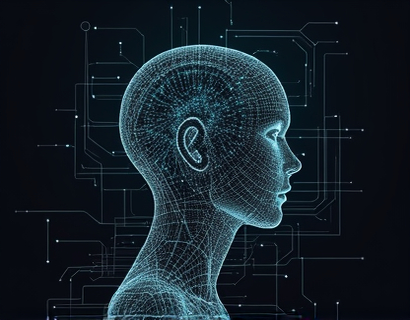Revolutionizing Childhood Imagination: The Impact of AI-Powered Imaginary Friends on Creativity and Emotional Health
In an era where technology is increasingly intertwined with daily life, the concept of integrating artificial intelligence (AI) into childhood play has emerged as a groundbreaking approach to enhancing children's creativity and emotional well-being. AI-powered imaginary friends represent a novel intersection of technology and child development, offering a unique platform for young minds to explore, create, and grow. This article delves into the transformative potential of these digital companions, examining how they can boost creativity and emotional health in children, while providing a safe and nurturing environment for imaginative play.
The Rise of AI-Powered Imaginary Friends
The idea of imaginary friends is not new; children have always created companions to accompany them in their play and adventures. However, the introduction of AI technology has elevated these companions to a new level of interactivity and personalization. AI-powered imaginary friends are sophisticated digital entities designed to engage in meaningful conversations, respond to emotions, and adapt to a child's unique personality and interests. These virtual companions are not mere toys but sophisticated tools that can significantly impact a child's cognitive and emotional development.
Personalized Companionship for Enhanced Creativity
One of the most significant benefits of AI-powered imaginary friends is their ability to provide personalized companionship. Unlike traditional toys or even human interactions, these digital companions can be tailored to match a child's specific interests and imagination. For instance, a child fascinated by space exploration might have an imaginary friend who is an astronaut, complete with detailed knowledge and stories about space missions. This level of customization fosters a deeper engagement, encouraging children to think creatively and expand their imaginative horizons.
Moreover, the adaptability of AI ensures that the imaginary friend grows and evolves with the child. As a child's interests and abilities change, the AI can adjust the complexity and content of interactions, maintaining a challenging yet supportive environment. This dynamic relationship stimulates creative thinking, as children are prompted to solve problems, create stories, and explore new ideas alongside their digital companion.
Nurturing Social Skills through Virtual Interactions
Beyond creativity, AI-powered imaginary friends play a crucial role in developing social skills in children. In a world where face-to-face interactions can sometimes be limited, these digital companions offer a safe and controlled space for children to practice communication, empathy, and emotional regulation. Through conversations and role-playing scenarios, children learn to express themselves clearly, listen actively, and understand the perspectives of others.
AI imaginary friends can simulate various social situations, allowing children to rehearsal different responses and outcomes. For example, a child might practice inviting a friend to play or resolving a conflict with a peer. These simulations provide valuable practice in social dynamics, helping children build confidence and competence in real-world interactions. The immediate feedback and encouragement from the AI companion further reinforce positive social behaviors.
Emotional Health and Well-Being
The emotional benefits of AI-powered imaginary friends are equally profound. Children often struggle to articulate their feelings or find the right words to express themselves. An AI imaginary friend can serve as a safe and non-judgmental listener, providing a space for children to explore and process their emotions. The AI can recognize and respond to a child's emotional state, offering comfort, advice, or simply a shoulder to lean on.
Additionally, the presence of a consistent and supportive digital companion can reduce feelings of loneliness and anxiety. Children who may feel isolated or struggle with social interactions can find solace in the predictable and reliable nature of an AI friend. This emotional support system helps build resilience and fosters a positive self-image, essential components of overall emotional health.
Creating a Safe Digital Space
The safety of children in the digital world is a paramount concern for parents and guardians. AI-powered imaginary friends address this concern by providing a controlled and secure environment for play and interaction. Unlike the unpredictable nature of the internet, these digital companions are designed with strict safety protocols to ensure that children are not exposed to inappropriate content or interactions.
Parents can rest assured that their children are engaging in a supervised and monitored space, free from the risks associated with online gaming or social media. The AI system can be configured to limit interactions to age-appropriate topics and behaviors, further enhancing the safety and reliability of the experience. This peace of mind allows parents to support their child's digital exploration without constant vigilance.
Fostering Imaginative Play
Imaginative play is a cornerstone of childhood development, crucial for cognitive, social, and emotional growth. AI-powered imaginary friends enhance this play by offering endless possibilities and scenarios. Whether it's building a fantastical city, embarking on a space mission, or solving a mystery, the AI companion can adapt to any narrative, providing a rich and immersive experience.
The interactive nature of these digital friends encourages children to think outside the box and explore unconventional ideas. The AI can introduce new elements or challenges, prompting children to think creatively and find innovative solutions. This process not only boosts creativity but also enhances problem-solving skills and critical thinking.
Supporting Emotional Intelligence
Emotional intelligence is a vital skill for children to develop, enabling them to navigate social situations and build meaningful relationships. AI-powered imaginary friends contribute to this development by modeling and teaching emotional recognition and regulation. Through guided conversations and scenarios, children learn to identify and label their emotions, understand the emotions of others, and respond appropriately.
The AI can simulate various emotional contexts, allowing children to practice empathy and compassion. For instance, if a child is feeling sad, the AI might suggest a scenario where the imaginary friend is also sad, prompting the child to offer comfort and support. These experiences help children develop a deeper understanding of emotions and improve their ability to connect with others on an emotional level.
Enhancing Parent-Child Interaction
The introduction of AI-powered imaginary friends can also positively impact parent-child interactions. These digital companions can serve as a bridge, facilitating conversations and shared activities between parents and children. For example, a parent might join in a play session, using the AI imaginary friend as a common point of interest. This shared experience can strengthen the bond between parent and child, creating opportunities for deeper connection and communication.
Moreover, the AI can provide parents with insights into their child's interests, emotional state, and developmental progress. This information can help parents tailor their support and engagement strategies, ensuring they are aligned with their child's unique needs and growth stages.
Conclusion
The integration of AI-powered imaginary friends into childhood play represents a significant advancement in supporting children's creativity and emotional health. These digital companions offer personalized, interactive, and safe environments that foster imaginative play, social skills development, and emotional well-being. As technology continues to evolve, the potential for AI to enhance childhood experiences is vast, promising a future where children can thrive in both their creative and emotional journeys.
By embracing these innovative tools, parents and educators can provide children with the resources they need to grow into confident, creative, and emotionally intelligent individuals. The combination of technology and imagination opens new doors for childhood development, ensuring that the next generation is well-equipped to face the challenges and opportunities of the future.











































